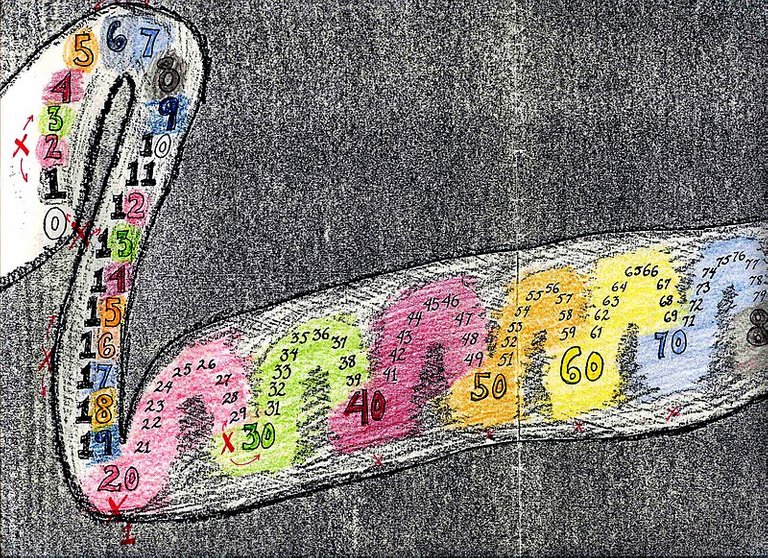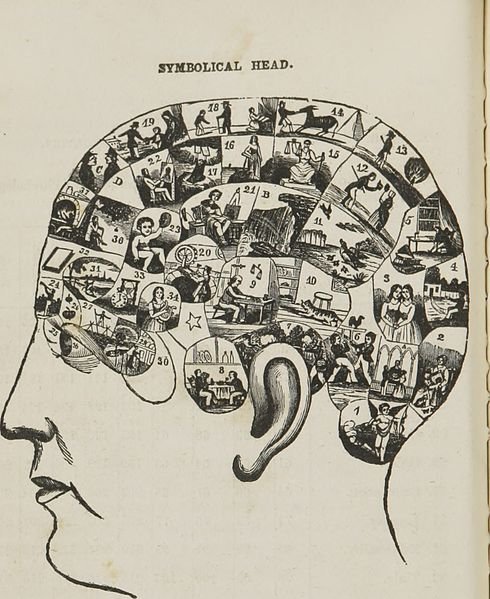Like everyone, sometimes I have difficulties when studying. When a topic just does not seem interesting to me, or I have my mind in other places, it is extremely hard for me to concentrate and memorize what I am reading. To try to overcome this, I usually complement reading books and texts with watching videos of classes on the subject; I find it easier to memorize the audiovisual than what is written. But of course, sometimes this is not possible; watching a video on pharmacology does not help memorize names such as hydrochlorothiazide or ceftriaxone, and watching how an endoscopic retrograde cholangiopancreatography is performed does not make it easier to learn the name of the procedure. At times like these I would like to have been born with a photographic memory, like many characters in fiction such as Sherlock Holmes or Dr. Gregory House; see the page of a book and instantly memorize it as if it were a screenshot, and be able to access that mental image when necessary. But is there really such a thing as photographic memory? Have we been deceived all our life by believing that it was real? Stay until the end of the article to find out, today, in Medical Myths:
Medical Myths: Does Photographic Memory Really Exist?

It has been attributed to the greatest geniuses, both in history and in fiction. All of us have wanted to have it, believing that it is the key to a superior intellect, or perhaps the other way round, that only those with a much higher than average intelligence possess it. But let's face it, the concept can sometimes seem somewhat implausible. Are there really people who can perfectly memorize something, down to the smallest detail, just by looking at it for a few seconds? Surely someone with this ability would be an eminence not only in one field of study, but in absolutely all of them; it would be enough to take as many books as possible of all the topics they could find and read them all. It would take quite some time, true, but after memorizing several dozen texts of each existing science that person would surely become the most famous and important scholar in the world, and presumably he would develop psychic and telekinetic powers or something like that. Why has someone like that not emerged yet?
Well, let's go step by step; first, let's see how memory works. We may think that memories are stored in a similar way to a computer; that is, as a kind of file in a folder that we can access when we need it, but the truth is much more complex than that. Each individual memory is actually a construct composed of several parts, when we think of an event, the brain seeks to remember all its characteristics: not only what we saw and heard, but also what we felt (temperature, pain, physical contact), what we smelled, and even what we savored during that moment. The same happens when we remember an object; we remember how it looks, how it sounds, the smell we felt when we saw it (not necessarily that of the object), its name and its function. All these parts of an individual memory are stored in different areas of the brain, and we access them separately to later unite them and create a whole. This is why sometimes we remember only certain parts of something or someone; surely it has happened to all of us that we come across an old classmate, and we remember all the years he studied with us, that he hang out with the emo kids from 7th to 9th grade and then he was a hipster until graduation, that he suffered from diarrhea one day in 8th grade and he had to wipe with a sock, and that his younger sister had a crush on your best friend, come on, we could almost write his biography, but we just cannotremember his name no matter how hard we try. Our brain accesses most of the parts of the memory we have about him, but it fails to extract that specific bit of data.

Then, using the previous analogy, it is clear to us now that memories are not stored in one, but in several folders. Let's go further, and imagine that these folders are stored in the cloud, and we need an internet connection to access them. But of course, if we need a memory very often the logical thing is that we download it to access it more easily, or that the file is saved in the cache memory so that it takes less time to load. The same happens with our memories; the folders in which they are stored are brain cells, neurons, and the internet connection we need to extract them are known as synapses. If we evoke the same memory many times, these synapses are strengthened and it becomes easier to remember, just like when we sing the same song every day, and in weeks we can recite the lyrics perfectly without almost paying attention. The point is, that with this we can realize that the brain is an organ, which like others can be strengthened, and remembering is a skill that can be practiced; just as we can exercise our legs and practice the ways of kicking a football to make that perfect pass or shot, we can exercise our brain and train our technique to remember things more easily.
Because of this, there are people around the world with the ability to remember a large amount of numbers, or to read a page of a book and recite it from memory, word for word, some time later. But do not get confused, this has nothing to do with photographic memory, they only practiced and optimized the way they access to certain memories, something that you can do. How to do it goes beyond the focus of this article (if you want me to explain the way, however, feel free to request it in a comment), but basically what you do is associate what you want to remember, be it words, numbers or images, with other things or sensations, so that there are more parts to that memory and they may be stored in a greater number of neurons, to facilitate access to them.
An example of this can be seen in the case of Solomon Shereshevsky (I had to copy and paste the surname, I shamelessly admit it), born in Russia in 1886, and the man with probably the best memory in history. Solomon could remember 70-digit numbers, poems in foreign languages, events that had occurred while he was just a baby, and complete speeches word by word, a skill that he used in his career as a journalist, never needing to take notes of anything, being able to perfectly remember everything that he lived. The secret to his perfect memory was that he suffered from a condition called Synesthesia, in which the senses; touch, taste, sight, smell and audition intermingle. For Solomon, each word had an odor, each number a different color or flavor. "Ointment" probably had an unpleasant acidic taste and a sickly green color, and the number 7 probably smelled of cheap perfume and thought he was better than the other numbers. 7 is a real asshole.

His synesthesia made it so each memory was connected to a huge number of synapses, and it was enough to remember the smell or flavor associated with a number or word to remember the whole event. In this way, the current mnemonics, memory professionals, are trained to associate what they want to remember to a variety of sensations or concepts to increase the amount of synapses created and facilitate their collection. We apply the same principle when using mnemonics, a very valuable resource for all of us who study a career with great theoretical content, and in which we establish a link or association between a concept or a series of difficult-to-learn names or words, and an image, or a short, easy to remember individual word or sensation.
In short, the vast majority of people who claim to be able to remember everything have actually only been trained to improve their memory; their brains are Rocky running up stairs of mnemonics. They may be able to remember large amounts of data, but show them the page of a book for only a few seconds and they will have the same difficulty remembering all its content as you do after a period of time; they do not possess a true photographic memory capable of instantly remembering everything they see. However, there is a similar phenomenon, although not equal, the eidetic memory.
The terms "eidetic memory" and "photographic memory" are constantly confused and used interchangeably, but there are differences between the two; eidetic memory is what is commonly treated as photographic memory in fiction, the ability to take mental pictures of an event, and access them as a screenshot on a phone. This capacity exists, and is present in 2 to 11% of children under the age of 12, but it is not perfect; it is subject to distortions and additions like all normal memories, and describing what is seen, or loosing focus while it is being remembered, interferes with the collection of the image. In addition, no cases of its existence have been found in adults, at least not that naturally occurring, without training, and unconsciously, probably because the linguistic development and verbal ability that comes with age makes children think more abstractly, and not depend so much on visual images.

Photographic memory, on the other hand, is understood as the type of memory in which events are stored not in fragments, as normally happens, but as a whole, and therefore they are collected in the same way, without changes or distortions. It is the ability to see a photo of a city, and years later to be able to paint it from memory, or to read a text and remember it always, word for word, without concentrating or needing to associate the memory with another sensation. This type of memory, and to finally answer all the questions that you probably still have, does not exist, or at least, no real cases have been reported. There are thousands of people with extraordinary memory, but it is usually by association with other sensations, and it is never completely perfect, especially when it comes to images.
It may seem disappointing, but at the same time it is inspiring; you can also have a memory like that. You were not born with the ability to remember everything without effort (nobody did), but by understanding how memory works, you can train yourself to strengthen the synapses of the memories you want to access, using easy-to-learn techniques. Your brain can also be Rocky, hitting that boxing pear of forgetfulness, winning the battle of study and success (and song lyrics, and unnecessary trivia... Let's be honest, if photographic memory existed, that is what you would use it for).
References:
- Simola, Anthony.The Roving Mind: A Modern Approach to Cognitive Enhancement, 2015.
- There’s No Such Thing As A Photographic Memory
- Does photographic memory exist?
- Is photographic memory real? If so, how does it work?
- How does memory work?
- How human memory works
- Eidetic Memory – Wikipedia
- Solomon Shereshevsky, the Unforgettable
- Synesthesia – Psychology Today
First, welcome back.
Secondly, this is an awesome post! You put a lot of effort into this for sure. I've known people with incredible memories and have wondered how they can remember the slightest details after just looking at something once. Thanks for your efforts.
Thanks a lot! So glad you liked it!
Congratulations! This post has been upvoted from the communal account, @minnowsupport, by mike961 from the Minnow Support Project. It's a witness project run by aggroed, ausbitbank, teamsteem, someguy123, neoxian, followbtcnews, and netuoso. The goal is to help Steemit grow by supporting Minnows. Please find us at the Peace, Abundance, and Liberty Network (PALnet) Discord Channel. It's a completely public and open space to all members of the Steemit community who voluntarily choose to be there.
If you would like to delegate to the Minnow Support Project you can do so by clicking on the following links: 50SP, 100SP, 250SP, 500SP, 1000SP, 5000SP.
Be sure to leave at least 50SP undelegated on your account.
I guess that's why people who are religious can remember things better. They have been trying to memorise their holy books for a certain period of time thus, making it easier for them.
That makes a lot of sense, and learning their prayers probably prepares them to memorize their books and scriptures.
You sound so much like me when I was absent from Steemit for 2 months and made a post about it when I returned lol. Maybe we are both just bad at being consistent :P
Anyway, you hit a really interesting topic. Photographic memory sounds like a comical superpower more than a real-life ability. I don't know for sure if it really exists or not because I haven't really researched about it in much detail and nor have I ever seen anyone remember something of extended length by just looking at it, though the idea does sound kinda cool and really useful for students haha.
I personally think the power of repetition is much more realistic than photographic memory, though I wouldn't be surprised if someone in the world actually does indeed hold that ability.
Great read! Your articles are really informative, I must say. You earned a new follower haha :D Have a great day!
Consistency is indeed not my forte, though I wash it was lol, and thanks for your comment! I hope you enjoy my future content as much as this article!
Human brain is capable to perform various activities, it's a pity for us,that no manuals for such a amazing organ called brain
Posted using Partiko Android
Indeed, the brain is full of little tricks, that thankfully we are all able to learn with some practice.
Hello ! You are in my "Steemit Overview #2" :)
Peace :)
https://steemit.com/dtube/@emsonic/ckwjtqhj
Posted using Partiko Android
Thanks a lot! I'll watch it right now ;)
Congratulations @mike961! You have completed the following achievement on the Steem blockchain and have been rewarded with new badge(s) :
Click here to view your Board
If you no longer want to receive notifications, reply to this comment with the word
STOPDo not miss the last post from @steemitboard:
Vote for @Steemitboard as a witness and get one more award and increased upvotes!
Hi @mike961
I just accidently found your account and I was wondering if you gived up on Steemit?
Not at all! I'm fact, I have an article ready to post. It's just that I live in Venezuela, maybe you've read about it, and we were a whole week without electricity. Even now we're still having problems with it, and due to this problems, we didn't have internet until a couple of days ago. I plan to post in a few days, on the weekend, once I have some free time (I have several exams this week). So thanks for the follow, there's a lot more content coming! (If the conditions in my country allow it lol)
Posted using Partiko Android
Hi @mike961
Thank you for your prompt reply. Appreciate it.
Please share link to your post with me (you can send memo with 2-3 sentences). I will be happy to support you with an upvote and drop some comment.
indeed I know much about Venezuela, as I have few very close friends from that part of the world (I met them just like I met you - on Steemit).
It's just so saddening :(
God bless Venezuela,
Piotr